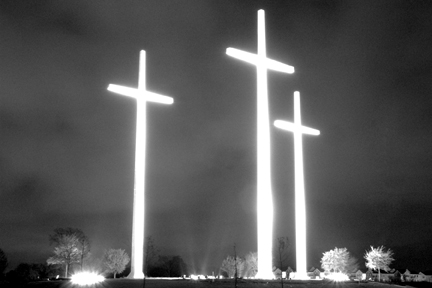Understanding the Gospel as Story
It is very popular in today’s evangelical culture to advocate living a “gospel-centered” life. Further, Christians are quick to remind others to “preach the gospel to yourself every day.” I think I understand what Christians mean by this, but I have seen a few problems that come from this kind of catchphrase Christianity. My goal is not to dissuade people from using these phrases, but to try to use biblical definitions to help others understand what living a gospel-centered life means.
What is the Gospel?
Most people are familiar with the fact that “gospel” is usually used to translate a Greek word, euangelion, which means, “good news.”
More specifically, however, I think it is fair to say that most people use the term “gospel” to refer to the following logical sequence. All human beings are sinners; and as sinners we are bound for eternal damnation. Jesus came to earth, lived a perfect life and died on our behalf, bearing our penalty so that we might receive eternal life rather than eternal damnation. Jesus rose again on the third day, securing new life for us. In other words, our salvation is all of grace having been secured by Jesus. We did not achieve our justification by any works of our own.
I obviously agree with the above truth, and give a hearty amen to this glorious reality! However, I think we short-change ourselves sometimes by not following the definitions given by Scripture. Out of the 76 uses of the term “gospel” in the NT, Scripture writers give a much broader definition to what constitutes the gospel.
Mark 1:1 says, “The beginning of the gospel of Jesus Christ, the Son of God.” Mark begins the “good news” of Jesus with the story of John the Baptist, and then proceeds to detail the sayings and works of Christ. I am not sure I have ever heard anyone start giving the gospel to someone by talking about John the Baptist, but that is Mark’s approach.
Mark uses gospel not in reference to Jesus’ saving death, burial, and resurrection only, but to describe the full-orbed plan of God. For example, Mark says Jesus proclaimed the gospel of God (Mark 1:14), telling people to repent and believe in the gospel (v. 15). Contextually these references have less to do with Christ’s death as they do with the proclamation of the arrival of a specific part of God’s program (which obviously is not separated from the importance of Jesus’ death and resurrection).
It is most interesting that Jesus sends out his disciples in Mark 6:7-13 and he tells them to preach repentance. This is apparently quite similar to the repentance and belief in the gospel that Jesus himself preached (Mark 1:15). Yet, during Jesus’ ministry He forbid the disciples from publicly proclaiming the fact that He was the Messiah (Mark 8:27-30).
The “gospel” as used by the NT writers and speakers is understood to mean the good news of God’s overall plan from Genesis to Revelation (cf. Matt 26:13; Acts 15:7; Rom 1:1; Eph 1:13; Col 1:23). Now, this does not mean that Jesus’ death, burial, and resurrection are not the most important part of the gospel (because without the work of Jesus the whole storyline of the Bible falls apart). But, it does mean that biblically speaking, gospel includes a much bigger plan than simply the salvation of humanity.
Living in Light of the Gospel
In our day, gospel has become synonymous with the message about Jesus’ death, burial, and resurrection. That is a great a glorious part of the gospel to be sure! But it is important to remember that the gospel is bigger than its application to you and me. The gospel is about the glory of God. He wins and restores creation, which mankind tarnished in Genesis 3. In other words, the gospel encompasses God’s entire story, from Genesis to Revelation. The crux of that story is the amazing work of Jesus, without whom the whole story collapses. But there is a reason we are given the whole of the story.
How should we live in light of this this broadly defined gospel? Knowing the overall plan of God and how we fit into it helps us understand what our duty is. This is why Paul’s epistles to the churches are filled with commands. Because when the church understands their part in God’s redemptive program, they have an obligation to live a certain way to reflect that reality before others. This is a believer’s duty within the gospel-plan of God. This is why a true understanding of the gospel produces good works. When we understand our part in God’s story, we live in line with that and seek to glorify God.
photo credit: Chiceaux via photopin

3 Comments
Peter Goeman
Thanks for reading and the good discussion question, Eric. I have two thoughts. First, in 1 Cor 15 (especially v.3) it appears Paul is stressing the primacy of Christ’s work through death, burial, and resurrection. So in other words the gospel doesn’t necessarily start with the Christ’s death, burial, and resurrection, but it is not a possibility without it. That is why Paul fights tenaciously for the authenticity of the resurrection in 1 Cor 15. Second, there are cases in Paul’s letters where the context seems to indicate he has a specific part of the larger picture of the gospel in mind–specifically the work of Christ in justification or united Jew and Gentile. So, it is also a lesson not to pigeon-hole a word into a singular meaning. Meaning is always derived from context. My point is that we often forget the big gospel picture because of a culturally contrived definition of words which does not match how biblical authors thought. Does that make sense?
Eric Dodson
Spot on! Thanks Peter.
Peter Goeman
That is a great observation, Ben! Letting the word do it’s work is essential! Thanks for that reminder.